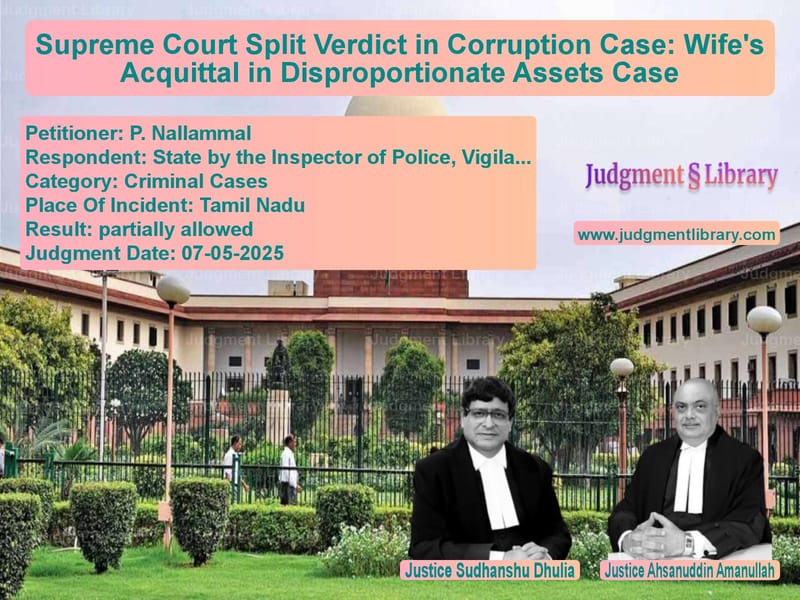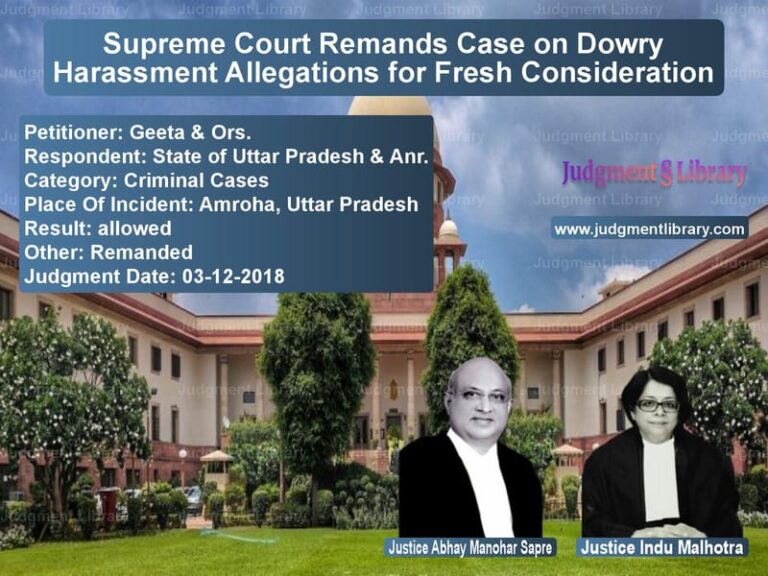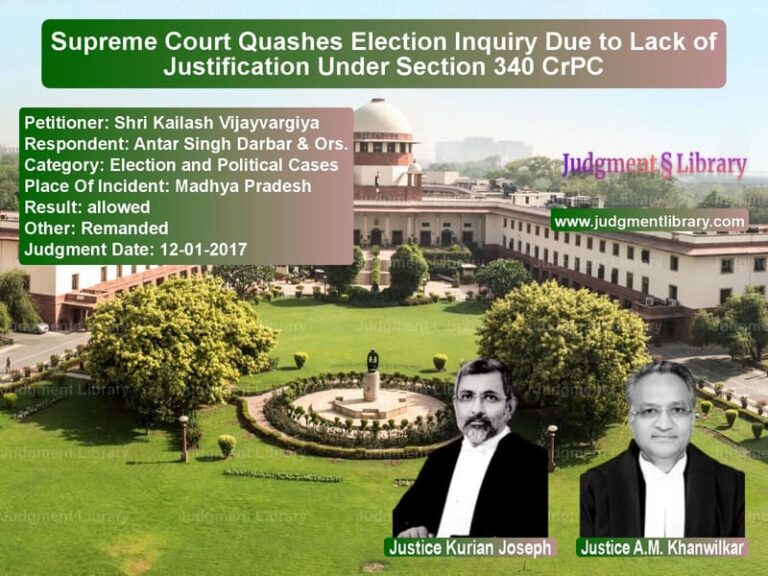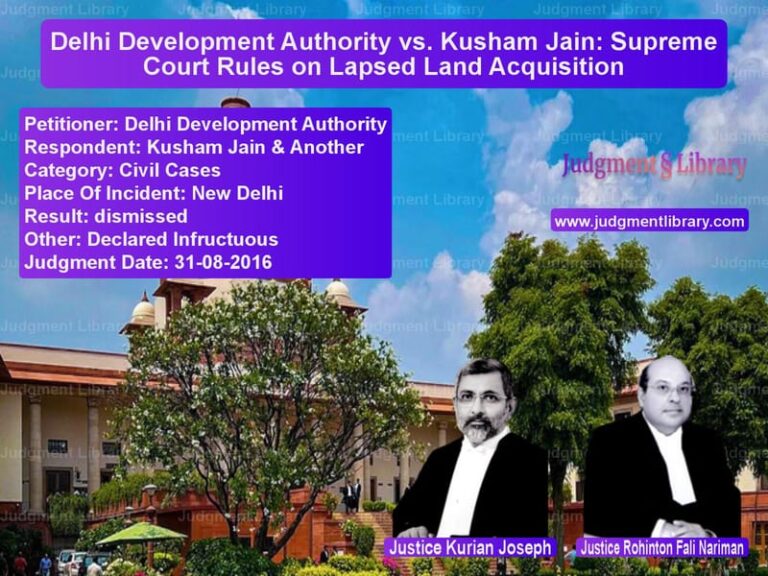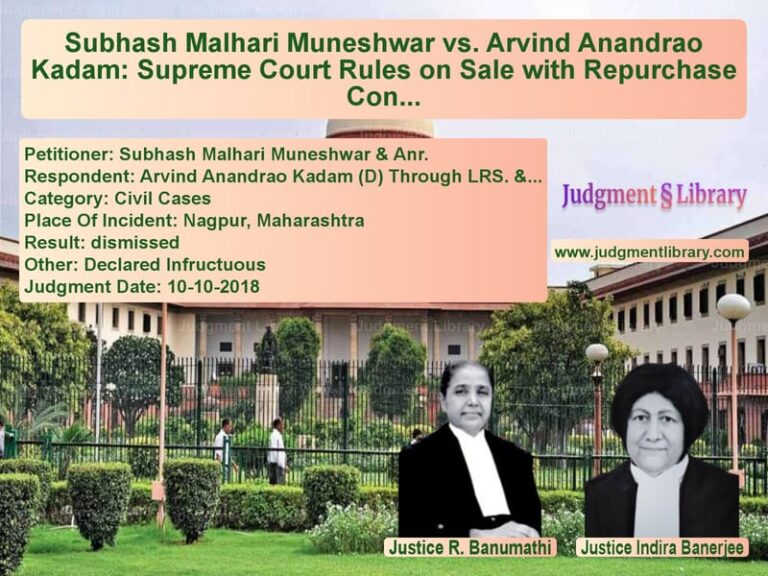Supreme Court Split Verdict in Corruption Case: Wife’s Acquittal in Disproportionate Assets Case
The Supreme Court of India recently delivered a split verdict in a high-profile corruption case that has been winding through the legal system for nearly three decades. The case involved P. Nallammal, wife of former Tamil Nadu Minister A.M. Paramasivam, who was accused of helping her husband accumulate assets disproportionate to his known sources of income during his tenure as a public servant.
The judgment reveals a fascinating divergence of opinion between two Supreme Court justices on the same bench. Justice Ahsanuddin Amanullah acquitted Nallammal of all charges, while Justice Sudhanshu Dhulia would have upheld her conviction. This division means the case will now be referred to the Chief Justice of India for appropriate directions, potentially to be heard by a larger bench.
The Case Background
The case dates back to 1996 when A.M. Paramasivam, who served as a Member of the Legislative Assembly and later as Minister for Labour Welfare in Tamil Nadu between 1991 and 1996, was accused of amassing wealth far beyond his legitimate earnings. The prosecution alleged that during what they called the ‘check period’ from June 16, 1991, to May 9, 1996, the couple had accumulated assets worth approximately Rs. 38 lakhs that were disproportionate to Paramasivam’s known sources of income.
While Paramasivam was charged directly under the Prevention of Corruption Act, his wife Nallammal was charged with abetment under Section 109 of the Indian Penal Code read with provisions of the Prevention of Corruption Act. The prosecution’s case was that although Nallammal had no independent income, she actively helped her husband acquire properties in her name and in the names of their minor children.
The trial court in 2000 convicted both accused. Paramasivam was sentenced to two years of rigorous imprisonment, while Nallammal received one year. The court also attached properties worth Rs. 35 lakhs under the Criminal Law Amendment Ordinance. Both convictions were upheld by the Madras High Court in November 2023, though the High Court slightly reduced the valuation of disproportionate assets to Rs. 33 lakhs.
The Strange Twist of the Missing Judgment
This case took an unusual turn when the appellants claimed that the High Court had actually acquitted them back in 2013. According to their submission, the criminal appeal was heard between February 8 and 20, 2013, before a Single Judge who reserved judgment and then pronounced an acquittal on April 30, 2013.
The appellants stated that they repeatedly applied for certified copies of this judgment but never received them. Meanwhile, Paramasivam passed away in March 2015. Years later, in 2018, the High Court listed the appeal for ‘fresh hearing,’ claiming there was no judgment from 2013 in the records.
Nallammal challenged this fresh hearing in the Supreme Court, which directed the Chief Justice of the Madras High Court to conduct an inquiry. The inquiry concluded that no such judgment existed, and the appeal was directed to be heard afresh, leading to the impugned November 2023 judgment that forms the subject of the current appeal.
Justice Amanullah’s Reasoning for Acquittal
Justice Ahsanuddin Amanullah, in his judgment acquitting Nallammal, made several crucial observations about the nature of abetment and the evidence required to establish it. The judge emphasized that mere registration of properties in the name of a public servant’s relative does not automatically make that person guilty of abetment.
Justice Amanullah noted: “The 2nd Accused is the widow of the 1st Accused-public servant. The assets standing in her name are three immovable properties, two cars, share certificates and some cash balance in the bank. Pausing here, we may note that the Trial Court has observed that the 2nd Accused showed interest to purchase the land, that she had given the sale consideration which is proved by witnesses and therefore her acts fall within the third limb of Section 107 of the IPC, which is one of intentional aid. Regard being had to the fiduciary relationship shared between the Accused, mens rea cannot ipso facto be presumed by the mere fact that some assets stood in the name of the 2nd Accused, and she had extended consideration for the same.”
The judge further observed: “This Court cannot be oblivious to human realities, especially the usual course of human conduct in marital relationships. We are cognizant of the presumptions provided for in criminal law, but the same by itself cannot supplant evidence. We reiterate that suspicion, however strong, cannot take the place of evidence. To presume culpability of a close relative of the public servant merely on the ground that certain transactions were made in such relative’s name would be akin to reversing the burden of proof. This may have dangerous consequences and result in diluting the presumption of innocence, beyond what the statute in question contemplates.”
Justice Amanullah pointed out a critical gap in the prosecution’s case: “Another striking feature in the present case is that during the entire trial, the prosecution never took the line of proving that the 2nd Accused was all along aware that the money from which the assets were being bought in her name was obtained through ill-gotten or unlawful sources. Thus, under bonafide belief, she has tried to defend the acquisition of the assets trying to explain the sources from various means which cannot lead to the presumption in law that she was party ab initio to such illegal acquisition(s) as ultimately she is a housewife and, from the record, it can be safely stated that it was the late husband-1st Accused who arranged for the money from which the assets, disproportionate to the known sources of the income of the family, have been bought in her name.”
Justice Dhulia’s Dissenting Opinion
Justice Sudhanshu Dhulia took a completely different view of the evidence and the law. In his dissenting opinion, he would have upheld Nallammal’s conviction, finding her an active participant in her husband’s corruption.
Justice Dhulia emphasized the volume of transactions conducted in Nallammal’s name: “Thus, it is not the case that there were only one or two transactions in the name of the appellant for which the appellant can say that she acted in a bona fide manner without knowing that the funds which were used for acquiring these assets were from unlawful sources. In my considered opinion, these transactions during the check period demonstrate how the appellant aided her husband in the accumulation of disproportionate assets by allowing him to register the same in her name.”
The judge further noted: “The High Court notes that the total salary drawn by accused No.1 during the check period was Rs. 2,17,178, and considering this, it is impossible to imagine that the appellant was not aware of her husband’s legitimate income. It is very hard to believe that she was not aware that these assets which were in her name were not acquired from her husband’s legitimate sources of income.”
Justice Dhulia relied heavily on an earlier Supreme Court judgment involving the same parties: “The Trial Court as well as the High Court have rightly relied upon the decision of this Court in P. Nallammal & Anr. v. State (1999) 6 SCC 559 to hold the appellant guilty of abetment of the offence of Section 13(1)(e) of the PC Act. In that case, this Court had accepted the submission of the State that a person who is not a public servant, can also be an abettor for the offences under Section 13 of the PC Act.”
He specifically referenced one of the illustrations from that earlier case: “If a public servant tells A, a close friend of his, that he has acquired considerable wealth through bribery but he cannot keep them as he has no known source of income to account, he requests A to keep the said wealth in A’s name, and A obliges the public servant in doing so. If it is a proved position A is guilty of abetment falling under the ‘Thirdly’ clause of Section 107 of the Penal Code.” Justice Dhulia believed Nallammal’s case squarely fell within this illustration.
The Legal Principles at Stake
This case revolves around the interpretation of Section 109 of the Indian Penal Code, which deals with abetment, and Section 13(1)(e) of the Prevention of Corruption Act, which criminalizes the possession of assets disproportionate to known sources of income by public servants.
Both judges agreed on the fundamental legal principle that non-public servants can be guilty of abetting corruption offenses. Where they differed was in the application of this principle to the facts of the case, particularly regarding what constitutes sufficient evidence of abetment.
Justice Amanullah emphasized the high standard of proof required in criminal cases: “The presumption of innocence is a basic tenet of criminal jurisprudence and it gets dislodged only by presenting cogent and reliable evidence. Not for nothing is it stated that the accused is the favourite child of the law and to him/her enure all the benefits of doubt as available in law. There is absolutely no evidence on record, much less any evidence to satisfy the standard of proof beyond reasonable doubt to establish that the 2nd Accused conspired/colluded with or intentionally aided the 1st Accused in committing offence(s) under Sections 13(2) r/w 13(1)(e) of the Act.”
Justice Dhulia, conversely, found the circumstantial evidence compelling enough to sustain a conviction, noting that Nallammal had personally visited registrar offices for registration of sale deeds on multiple occasions.
Conclusion and Next Steps
With the Supreme Court bench divided, the case regarding Nallammal’s conviction has been referred to the Chief Justice of India for appropriate directions. This likely means the matter will be placed before a larger bench for a final determination.
The split verdict highlights the challenging legal questions surrounding the culpability of family members in corruption cases. How courts distinguish between innocent name-lending and active participation in corruption has significant implications for anti-corruption efforts and family members of public servants.
As Justice Amanullah poignantly observed in his judgment: “Life and liberty are not things to be trifled with on the basis of conjectures and surmises.” This case ultimately forces us to confront difficult questions about how far the net of culpability should be cast in corruption cases and what evidence is sufficient to establish that a family member crossed the line from innocent spouse to active accomplice.
Petitioner Name: P. Nallammal.Respondent Name: State by the Inspector of Police, Vigilance and Anti-Corruption Police, Dindigul, Tamil Nadu.Judgment By: Justice Sudhanshu Dhulia, Justice Ahsanuddin Amanullah.Place Of Incident: Tamil Nadu.Judgment Date: 07-05-2025.Result: partially allowed.
Don’t miss out on the full details! Download the complete judgment in PDF format below and gain valuable insights instantly!
Download Judgment: p.-nallammal-vs-state-by-the-inspect-supreme-court-of-india-judgment-dated-07-05-2025.pdf
Directly Download Judgment: Directly download this Judgment
See all petitions in Fraud and Forgery
See all petitions in Other Cases
See all petitions in Judgment by Sudhanshu Dhulia
See all petitions in Judgment by Ahsanuddin Amanullah
See all petitions in partially allowed
See all petitions in supreme court of India judgments May 2025
See all petitions in 2025 judgments
See all posts in Criminal Cases Category
See all allowed petitions in Criminal Cases Category
See all Dismissed petitions in Criminal Cases Category
See all partially allowed petitions in Criminal Cases Category

